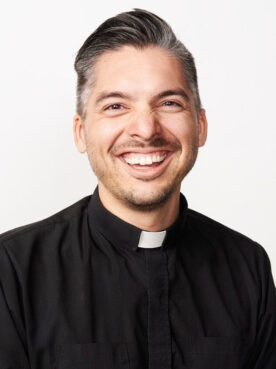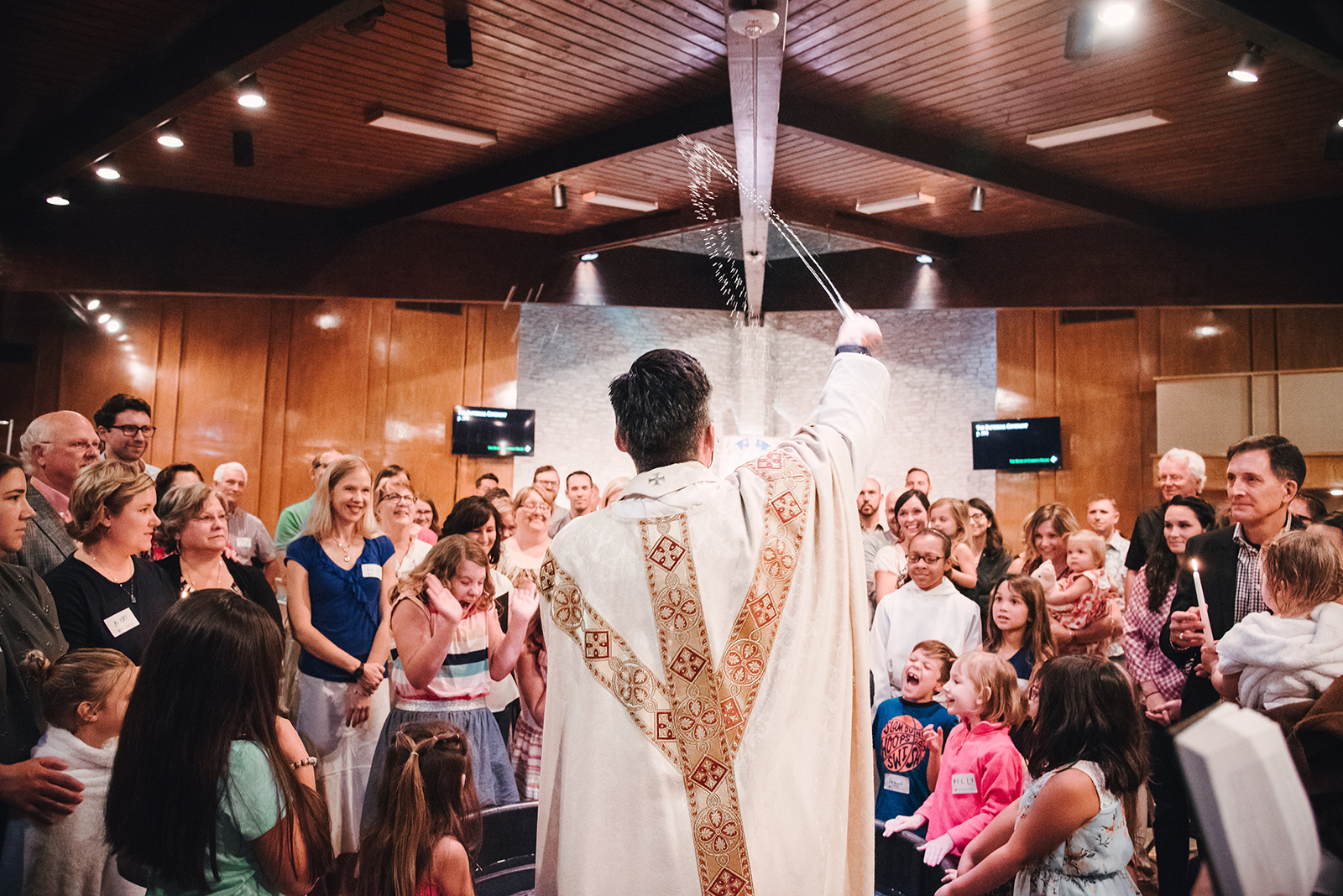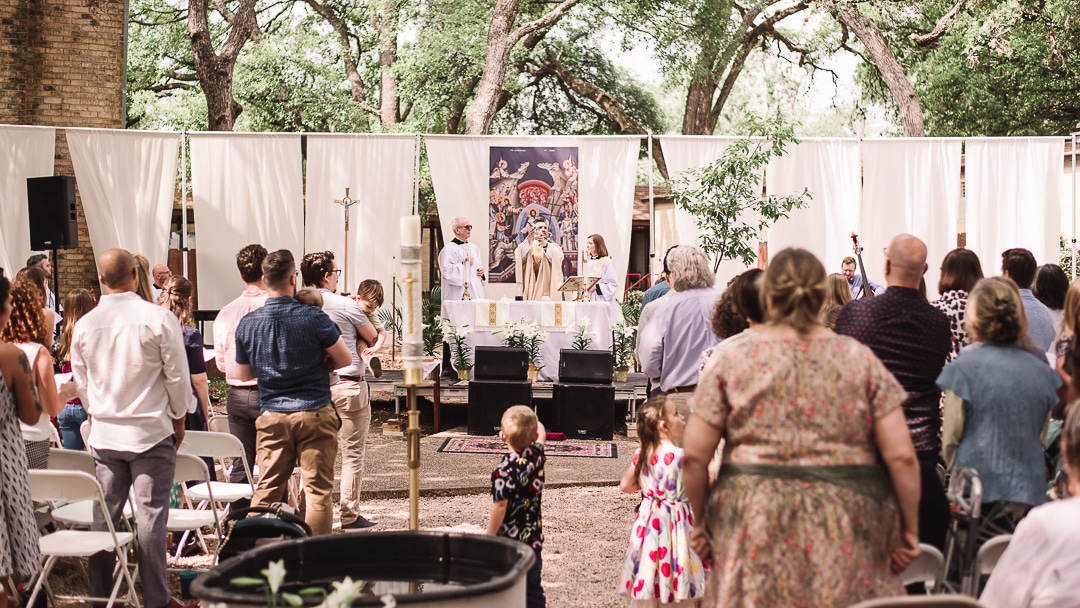
(RNS) — When the Anglican Church in North America broke off from the Episcopal Church and the Anglican Church of Canada in 2009 over their acceptance of LGBTQ clergy and same-sex marriage, the split was not exactly amicable.
Years of infighting and slow, grinding property lawsuits that followed the split have kept tensions between the two groups alive. So when an ACNA church plant in Austin, Texas, announced in July that 80% of the congregation supported joining the Episcopal Church, it raised eyebrows.
Founded years after the schism, Resurrection Anglican Church in South Austin is one of three parishes that have departed ACNA’s Dioceses of Churches for the Sake of Others in the past two years. Two of those parishes, Resurrection and The Table in Indianapolis, have pursued affiliation with the Episcopal Church, with the third, St. Mary of Bethany in Nashville, Tennessee, remaining unaffiliated.
If you ask the Rev. Shawn McCain Tirres, rector of Resurrection Anglican Church, the real story of the church’s departure isn’t about denominational politics. It’s about a local parish that faced difficult questions head-on, and came out the other side.
“It feels like we did the impossible,” McCain Tirres told Religion News Service in a recent interview. “We really fought for this, we stuck this out and we trusted God and each other. We had a lot of hard conversations. And here we are. We’re still together. Look what God has done.”

The Rev. Shawn McCain Tirres. Photo courtesy of RezAustin.com
RNS spoke to McCain Tirres about his parish: how it formed, the ways it has changed and what ultimately led it to the disaffiliation. This interview has been edited for length and clarity.
How was Resurrection founded?
I have a large Latino Catholic family and family in West Texas. While I was at a family reunion out here, I had this moment where I felt the invitation of the Holy Spirit to come here and get to work.
In 2015, my family and I moved to Austin from Santa Cruz, California, sent from the church that we had planted there with another family. It was word-of-mouth, a lot of prayer and in-home gatherings. We gathered a critical mass of people and started a launch team, then finally launched Easter of 2015.
What makes Resurrection distinct?
We throw a lot of parties in the neighborhood at pubs and parks. Our culture of evangelism isn’t pushy. We have what I would call a very “fiesta” culture, which is making a ton of food, throwing a huge party and inviting everyone in earshot.
Another distinction is that we are very high church. We have a lot of incense, smells and bells, robes, a strong sense of reverence. People have called us a “low-key high church.” We’re going to have a good time, but we’re standing in the presence of God.
Who attends Resurrection?
It’s probably majority post-evangelical — people wanting to be in a room with the lights on, where they’re involved. Then there’s a bunch who came from Catholic or Orthodox backgrounds, and probably 25% of people had never stepped foot in the church.
There’s another pocket of people who were connected to the Anglican churches in town, but not very many. And then it was a lot of word-of-mouth in the neighborhood. So the makeup of our church is very South Austin. You have young families with kids, a huge Latino population and more affluent families. And every age.
The younger people want an expression of church that isn’t power hungry and abusive and coercive. I think there is a sense, especially among younger people, that we need a humble and gentle Christianity. Also, there’s a lot of interest in liturgy. We’re not quite Catholic, but we’re definitely not megachurch evangelicals. So we checked a unique set of boxes for people.
What are some of the most significant ways that Resurrection has evolved since 2015?
The pandemic years were a microcosm of the ways we’ve changed. We were dealing with white supremacy and racism, beginning to name that in sermons and in prayers. Also, we were reckoning with the ways that patriarchy has been slightly out of view for a lot of us men. And from the very beginning, we’ve also had sexual minorities in our community. We know Jesus well enough to know he would be around them.
For the sexual minority community, especially in a very conservative area, it created this really safe place. Word gets out. There was never any sort of intention of being some weird, edgy church; it was just, these are the people that God was bringing to us and we wanted to welcome them.
The thing we have a special ear for is when the most vulnerable speak up. For example, when someone in privilege and in the majority says we don’t need to wear masks, we listen instead to the elderly and medically compromised. I learned this from Latino theologians, especially Gustavo Gutierrez’s theology of liberation, which describes a preferential option for the poor based on Jesus’ ministry. When that clicked for me, I realized I don’t have to be a pastor that listens equally to every concern.

Baptism service at Resurrection Anglican Church in Austin, Texas. Photo © Kelly Carlson
How did Resurrection discern its denominational affiliation?
In late April, the news came out about the archbishop of Uganda giving vocal support for the imprisonment and execution of gay people in Uganda. There was an interview with ACNA Archbishop Foley Beach where instead of plainly rejecting the legislation as evil, it was this really softened response. I had people in our church who printed out the article and asked, is this us? Is this what we’re part of?
That week, I told Bishop Todd Hunter, a longtime mentor of mine, that considering the College of Bishops’ lack of response (to what was happening in Uganda), I couldn’t do this anymore.
It’s creating an unsafe environment for sexual minorities in our church. And he said, graciously, ‘”It sounds like you are in a place of misalignment with the ACNA. I think it would be best for you to bring this to your church, and bring it to a vote in two months.” Because I had expressed that I had lost confidence in the ACNA, I couldn’t with integrity continue with my job if the church voted to stay.
Every Sunday for a month, we turned off the livestream, closed the doors. The vestry, clergy and I fielded questions and heard concerns. We prayed a lot too. We had midweek evening prayer for the church, and we would visit table groups and talk and pray together. That month was intense. But really, the gift was we weren’t afraid to talk about the difficulty. We were able to practice peacemaking, listen to each other and seek understanding. We expected God to be present with us in our work and he was.
At the end of that month, the vestry hosted the vote, and by Tuesday morning I got a call from our senior warden with the results. It’s bittersweet because our colleagues in our diocese and our bishop, we love these people. These are our dearest friends. But it was a question about who God had made this church to be, with these people in this place.
What were some of the biggest factors congregants were weighing during this process?
The hard part was around sexuality. It wasn’t that people were afraid of diversity. It was a concern that if we disaffiliated from the ACNA and moved towards the Episcopal Church, we would join a body that would change us in ways that we don’t want to change. Though change can be difficult, our parish has never been afraid of it, especially when we sense God‘s invitation.
I had to continue to reframe the discussions to say, this isn’t a vote about becoming open and affirming. People who have a traditional sexual ethic don’t have to change to go forward. What we’re saying is, more would have to change if we were to stay in the ACNA than if we were to leave, because of the ways that we were already including sexual minorities, addressing the treatment of women and confronting racism.

An outdoor service at Resurrection Anglican Church in Austin, Texas. Photo © Kelly Carlson
What implications did this vote have for same-sex marriage and the ordination of queer folks?
We have to have our own conversation as a church, openly, with curiosity and in faith. We are already an inclusive church. We already have people serving who are gay. We’ve just hit a limit within the ACNA in terms of leadership. There’s this whole community in our church that now feels safe to volunteer and take their place in the church, which is such good news to us.
And yet there’s work to be done. How do we engage the very complex topic of sexuality? It’s been oversimplified and ratcheted up to a crisis of orthodoxy, which I think is inappropriate. This isn’t something that defines a Christian. So let’s rest in that and actually talk about what Scripture says. We have classes coming up about what it means to be a Christian and how we read the Bible. And from there, we’ll dive into, how do we interpret the Bible about what it’s saying about sexuality? And how do we carry those interpretations in ways that are generous and humble?
Then there’s the other process in the Episcopal Diocese of Texas. Before you can even do same-sex marriages, you have to go through a discernment process with your parish. I think there’s a lot of wisdom and goodness in that, especially for our church.
What was the biggest challenge during the disaffiliation process?
There was a cost to this. We lost some dear family and friends. This was so personal for people. We’re so deeply invested in community, in each other’s lives. We’re still in touch with those people and offering to connect them with another church, providing pastoral care.
How do you view this disaffiliation in the context of broader denominational politics?
This gets folded into an old storyline of conflict between the ACNA and the Episcopal Church. People assume that we were Episcopalian before, but we were planted as an Anglican church. These aren’t our fights. Our local parish doesn’t have the same history. We have matured and developed a deeper sense of who we are, who God has made us to be and where we’re going. That’s when we realized we need to have a hard conversation about feeling like we’re getting in the way of the denomination we’re in. So for us, it started with the local church.
